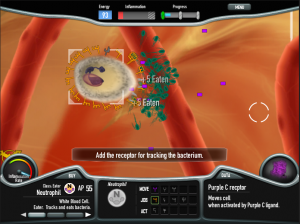Seeing what things do. This is science, as I see it. What does this thing do when I put it next to that thing? What happens if that thing is missing? How do these things develop from this simple group of things to this complicated group of things? If I poke it while it is developing, will it still develop?
If you are a scientist you poke at things. If you are a biochemist, the things you poke at are proteins and other molecules like cholesterols, lipids, DNA, RNA and small molecules like vitamins and amino acids… If you are a biochemist, the simple system you might study is a cell. The cell might develop into a complicated system of cells… like say, an embryo or a tumor or an immune system.
That is pretty cool, right? Who wouldn’t want to study that? Seriously, it’s neat and important. It’s a fun little world to explore, of course, everyone wants to!
The trouble is that we don’t teach the cool part first, we make everyone memorize facts like “A cell is the smallest unit of life.” Really, we should learn exciting bits like, “Cells can become tumors and cells can also be the heroes that kill the tumors!” Sadly, the cool parts of most sciences are hidden from us until we get to graduate school. We don’t get to poke at things until we get into the lab.
In the lab, I can change how many copies of a protein are in a cell at a time. If I change the concentration of this protein, will that affect the cell? Does this protein cause cancer? Does it cause happiness? Health? Is it required for metabolism or for absorbing harmful ultraviolet light? Does it repair DNA damage or does it send the signal that all DNA damage is repaired and that the cell can now safely copy the DNA and divide into two cells?
“What does this protein do?” is clearly a very interesting question. It is such an interesting an important question, that we have lots of words to talk about it. We talkabout “increasing protein expression” when we mean that the cell has more copies of a protein. Or we say “protein expression has been down regulated” when we mean that there ae fewer copies of a protein in a cell.
“What does this protein do?” Is the really cool question that would really draw people into science, let them see the real curious parts. In the lab, it takes me years to answer this question. I start by forcing otherwise “normal” cells to express many copies of the protein. This first simple experiment takes weeks to set up! It might take years to figure out what the results mean. My curiosity drives me, because I have seen behind the boring stuff.
Immune Defense players get to see what proteins do right away. Immune Defense players can add and delete proteins from their cell’s surface instantly. Protein expression is regulated by a click on the game’s dashboard! Immune Defense players get to poke at a cell and see what happens. Our players get to see why a cell would switch its proteins. Our players get to make strategic decisions and make fun maneuvers, taking advantage of cells, surface proteins, location and activation state of cells… our players get to play with the fun parts of cell biology and biochemistry.. without the years of memorization and without the weeks of setting up wet laboratory experiments!
I wish I had a Microbot C85. Don’t you?



You really made that cool. I am also a Biochemist into teaching and research. Now i have some more ideas to make the subject ‘live’.
Thank you, Dr. Pradhan. This is why we made the game: so people can understand their own bodies and health issues better. Please let me know if you have any suggestions.